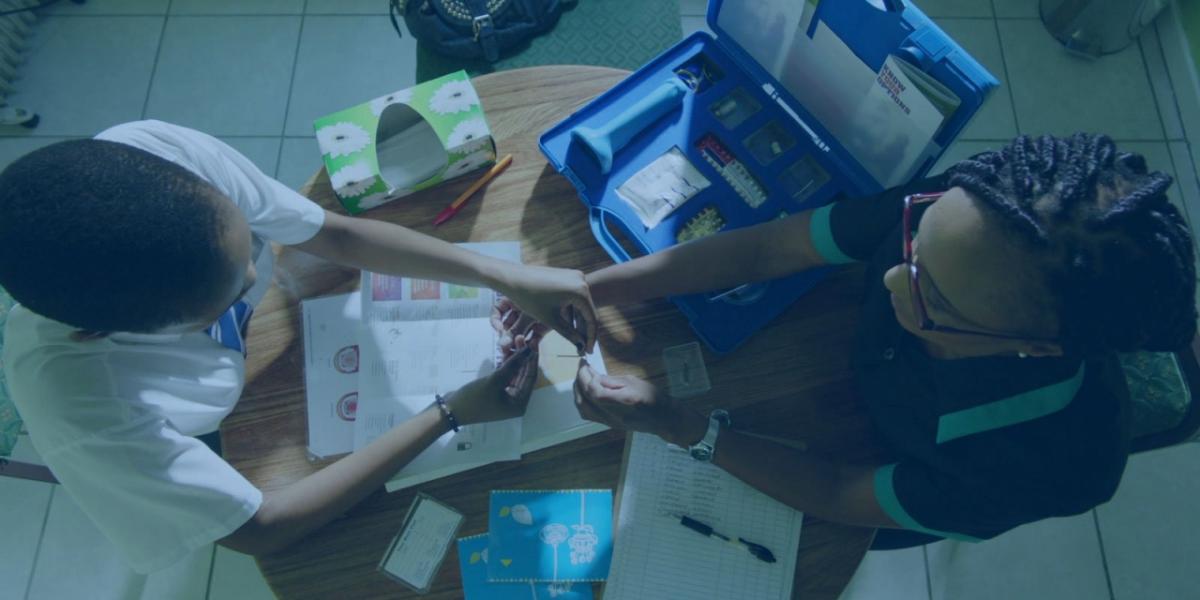How ‘MTV Shuga’ Made Viewers Twice as Likely to Get an HIV Test
The MTV Staying Alive Foundation uses 'MTV Shuga' to teach young people across sub-Saharan African about safer sex—and it’s working.

Originally published by Viacom
By Nicole Bitette
More than 1.2 million sub-Saharan Africans contracted HIV in 2017. The MTV Staying Alive Foundation is combating that frightening statistic by tapping the power of television to spread messages of safer sex via the popular scripted drama MTV Shuga.
It’s working. According to a study completed by the World Bank between 2014 and 2019, co-authored by this year’s co-recipient of the Nobel Prize for Economics, Professor Banerjee, viewers of the show’s third season were twice as likely to get tested for HIV as non-viewers and half as likely to report concurrent sexual partners. It also found a 55% decrease in positive tests for chlamydia among women viewers. The results also showed that participants’ friends were more knowledgeable about HIV transmission, suggesting that viewers may have shared what they learned from the show with others.
MTV Shuga, which explores the every day drama of young people’s lives, premiered in 2009, starring Lupita Nyong’o, an unknown actress at the time. The MTV Staying Alive Foundation (a 501c3 charity with the rights to use the MTV brand) had made previous attempts to reach young audiences with messages about sexual reproduction and health, creating annual documentaries and the 2005 film Transit. The non-profit would often time this content to World AIDS Day, which this year falls on Dec. 1.
But as Georgia Arnold, Executive Director of MTV Staying Alive and SVP of Social Responsibility for Viacom, pointed out: “You could be infected with HIV any day of the year.”
The Power of “Edutainment”
Arnold and her team created MTV Shuga as an evolution from the “water-cooler moment” of previous one-offs, crafting a TV drama that could draw in young people every week. They distribute MTV Shuga free to broadcasters across sub-Saharan Africa and make all episodes available online for no charge.
“We put young people at the heart of everything we do,” Arnold said. “Before we write a word of any storyline, the first thing we do is talk to our target audience It’s by understanding the entirety of their lives that allow us to create very strong storylines that absolutely reflect their lives, but within which we can create messages. They really see their lives reflected back at them on screen.”
For Arnold, the most impactful findings in the World Bank study are the tangible results it revealed, such as the likelihood of getting tested for HIV or the drop in chlamydia infection rates.
“The reason these results excite me is that you can draw a direct line between a viewer of MTV Shuga and going to get tested for HIV. Both the MTV Shuga viewers and non-viewers were given vouchers to get tested, so we could follow the viewers’ sexual health journey,” Arnold explained.
A Powerful Three Letters: MTV
While “edutainment,” or behavior change, campaigns aren’t new, MTV Staying Alive was the first to release something on this scale, according to Arnold. The fact that it airs on MTV only magnifies the show’s impact.
“Those three little letters at the start of our name, ‘MTV,’ gives us a head start,” Arnold says. “MTV is trusted and is cool, irreverent, but also speaks their language. It’s not patronizing or judging. I think the fact that Viacom has given us the privilege of using the brand in the way that we do for the past 21 years is quite remarkable, cutting-edge work. We’re talking about sex all of the time and Viacom trusted us, and sees the impact of our work on an audience.”
In addition to airing the TV series, MTV Staying Alive organizes young people to visit schools and communities or go door-to-door to show MTV Staying Alive’s content and explain to their peers MTV Shuga’s educational aspects. Much of this is done in partnership with the governments of South Africa or Nigeria.
The impact of MTV Shuga has inspired the MTV Staying Alive Foundation to launch new series geared toward changing viewer behavior. In India, they are launching MTV Nishedh, which focuses on sexual reproductive health, modern contraception, tuberculosis and adolescent nutrition. MTV Shuga: Babi is tailored to French-speaking Africa. The first season will present basic knowledge about HIV, including condom use, transactional sex, and tackling discrimination against people living with HIV in Côte d’Ivoire.
“We’re only as good as our last series,” Arnold said. “While the audiences love us and we’re having this wonderful remarkable impact, we have to make sure we’re keeping audience on our toes. Do we do spin-offs? Do we do digital content? There’s a lot of different opportunities as we look to the future.”

